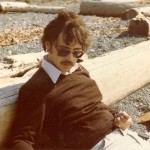Awards – Selected
Shimano Communiaction Award, Maximum Salmon, 2008
Best Photograph, Canadian Aviation Magazine, 2007
Shimano Communication Award, Outdoor Writers of Canada, Fishing for Dreams, silver, 2006
Shortlist, Dorothy Livesay Award, 2005, The Hunger
Shortlist, Dorothy Livesay Award, 2000, Love And Other Things That Hurt
People’s Poetry Award, 1998
Silver Medal, Bliss Carman Award, 1998
National Magazine Award nomination, 1999
Silver Medal, Bliss Carman Award, 1976
Affiliations
President, League of Canadian Poets, 2009 – 2010
President, Victoria Book Prize Society, 2005
President, Federation of BC Writers, 1996
Education
B.SC., Zoology, Biochemistry, U of Calgary, 1974
B.A., with Honours, English, Philosophy, U of Liverpool, 1976
Masters of Public Administration, U of Victoria, 1980
Life
 D.C. Reid walked out onto the Alberta prairie west of Calgary when he was three years old (1955) and never came back. When he was five he reached his hand into a stream and pulled out a trout. His life has been about water since that day. He was published in MacLeans when he was ten and thought the writing life would be easy. What an innocent.
D.C. Reid walked out onto the Alberta prairie west of Calgary when he was three years old (1955) and never came back. When he was five he reached his hand into a stream and pulled out a trout. His life has been about water since that day. He was published in MacLeans when he was ten and thought the writing life would be easy. What an innocent.
Since that time he has been published in more than 50 literary magazines in Canada, the United States, the U.K., India and Mexico, with his work having been translated into Spanish and Hindi. On the literary side of his writing life, he has published four books of poetry and one novel.
Along the way, and much to his surprise, he took a B.Sc. in biochemistry and zoology, then started over again, instead  of going on to a PHD in cancer research; going to England and taking a B.A. in English and Philosophy – both honours degrees. Arriving back in Canada in 1976 unable to find a job, Dennis was told by Eli Mandel at the then Banff School of Fine Arts he could write poetry, something he would never have guessed, nor ever do on his own.
of going on to a PHD in cancer research; going to England and taking a B.A. in English and Philosophy – both honours degrees. Arriving back in Canada in 1976 unable to find a job, Dennis was told by Eli Mandel at the then Banff School of Fine Arts he could write poetry, something he would never have guessed, nor ever do on his own.
Reid went on to do an M.P.A. to get a job to feed his new family. After going crazy with that and then spending the best decade of his life bringing his daughters up at home, he lost them through divorce, a sadness that continues.
In 1996, Patrick Lane told him at the now Banff Centre that his instincts were good and so was his work. He then jumped off the cliff and has lived in the fire of poetry since then. Now, he calls it: a necessary love. His fifth and sixth  books of poetry will come soon: What It Means To Be Human, and You Shall Have No Other. His book to follow those is: Elegies, and there is work from all three books on this site (and another six books).
books of poetry will come soon: What It Means To Be Human, and You Shall Have No Other. His book to follow those is: Elegies, and there is work from all three books on this site (and another six books).
On another side of his life, Reid has gone on to write for more than 50 magazines/newspapers/websites across North America on fishing – gear, fly and Spey – in salt- and fresh-water. His fourth fishing book will be released in 2008. When not at his computer, he will just as frequently be found in his Vancouver Island wilderness with the fish he likes to check on from time to time just to make sure they are okay. Once secure in that knowledge, he lets them go, sometimes seeing in his rounds as many as 500 in a year. His largest spring is 60 pounds – on his 8 weight.
 Reid has a canyon river he strays into more than he should, in his mid-fifties, for wild summer steelhead on the fly, climbing down cliffs with his fly rod between his teeth. And this has segued into another side of his writing life: he is delving into the hardcore science to write a book he has wanted for more than a decade: The Brains of Poets. You will see this and many other books on this site. Click here.
Reid has a canyon river he strays into more than he should, in his mid-fifties, for wild summer steelhead on the fly, climbing down cliffs with his fly rod between his teeth. And this has segued into another side of his writing life: he is delving into the hardcore science to write a book he has wanted for more than a decade: The Brains of Poets. You will see this and many other books on this site. Click here.
Still out there in his future is the fourth room of his mind. He will learn to play the piano and write an album of music. He is too embarrassed to sing in front of others, at the moment, but there is time to get over that. Having played clarinet and sax in jazz, Dixie and symphony, he can get his right hand to work on the black and white keys, but not his left. There is time for that, too.
 Home
Home What It Means To Be Human, 2010.
What It Means To Be Human, 2010. 